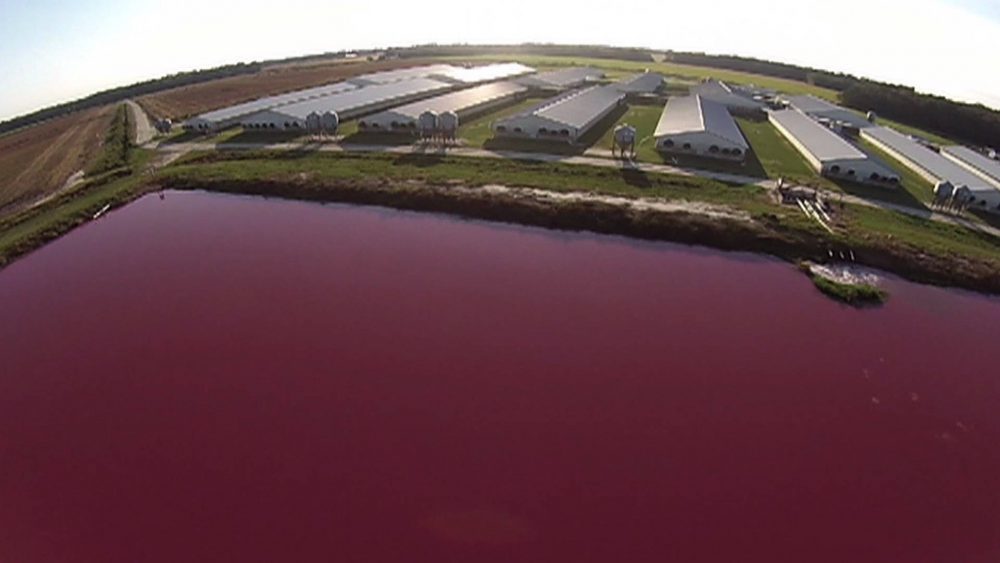Hog farmers all over North Carolina are racing to drain thousands of toxic manure lagoons, some the size of lakes, before Hurricane Florence comes through and causes those pits to overflow into drinking water and the growing “dead zone” off the North Carolina coast. The North Carolina Pork Council says its members have pumped down lagoon levels to absorb at least 2 feet of rain and that low-lying farms have been moving their hogs to higher ground. 1
RELATED STORY:
It’s already happened once before. And they didn’t learn their lesson.
“Computer models predict more than 3 feet of rain in the eastern part of the state, a fertile low-lying plain veined by brackish rivers with a propensity for escaping their banks. Longtime locals don’t have to strain their imaginations to foresee what rain like that can do. It’s happened before.
In September 1999, Hurricane Floyd came ashore near Cape Fear as a Category 2 storm that dumped about 2 feet of water on a region already soaked days earlier by Hurricane Dennis. The result was the worst natural disaster in state history, a flood that killed dozens of people and left whole towns underwater, their residents stranded on rooftops.
The bloated carcasses of hundreds of thousands of hogs, chickens and other drowned livestock bobbed in a nose-stinging soup of fecal matter, pesticides, fertilizer and gasoline so toxic that fish flopped helplessly on the surface to escape it. Rescue workers smeared Vick’s Vapo-Rub under their noses to try to numb their senses against the stench.”2
And now, Florence is forecast to make landfall in the exact same region. But, she’s a much stronger storm.
RELATED STORY:
This is serious. Jamie Kruse, director of the Center for Natural Hazards Research at East Carolina University said, “This one is pretty scary. The environmental impacts will be from concentrated animal feeding operations and coal ash pits. Until the system gets flushed out, there’s going to be a lot of junk in the water.” 3
North Carolina has around 2,100 industrial-scale pork farms containing more than 9 million hogs. As you can see from the pictures and videos above, hogs are typically housed in long metal sheds with grated floors which allow the animals’ urine and feces to fall through and flow into nearby open-air pits containing millions of gallons of untreated sewage. (Also, the farmland in the surrounding communities are regularly sprayed with this sewage. This practice is disgusting and must end now.)
RELATED STORY:
There is also concern for the more than two dozen massive coal ash pits operated by Duke Energy (the gray ash that remains after coal is burned contains potentially harmful amounts of mercury, arsenic and lead). Because the power plants need huge amounts of water to generate steam, their unlined waste pits are located along lakes and rivers. And yes, some of those pits flooded during Hurricane’s Floyd and Hurricane Matthew. But, Duke says they are more prepared than ever and that crews will be monitoring water levels at the pits throughout the storm. They are also preparing for the potential shutdown of nuclear reactors at least two hours before the arrival of any hurricane-force winds and have emergency generators and pumps to remove stormwater at the plant if it floods.
Brace yourselves everyone. And please stay safe.
XO- Erin












